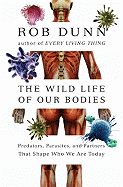
Biologist Dunn has produced a fascinating, wide-ranging, frightening and ultimately hopeful book about our human species. Dunn has drawn precise connections between the world 4.4 million years ago, the many similarities we share with other species evolving along with us and the overwhelming onslaught of contemporary diseases of the body and mind.
Agriculture, he suggests, was "a desperate act of post-apocalyptic sustainment" and not the continual improvement as we usually view it. The move from individual hunting/gathering to intensive dedicated farming, over time reduced our variety of foodstuffs to the current alarming 75% deriving from just six plants and one animal. Potato famine, anyone?
More puzzle pieces: as humans have "improved" health, we have opened the door to an array of devastating illnesses. Indoor plumbing removes our intestinal worms, and the ancient balance between whipworm and gut immune response flounders, producing Crohn's (first diagnosed in the 1930s). Leaf-cutter ants, diabetes, sickle-cell anemia, snakes, predators, hairlessness, xenophobia--all these and more are pieces of Dunn's argument.
Dickson Despommier's graduate students, spurred to action by the thought of a hungry, hot, arid, treeless Earth of 2050, began intense research into the requirements of urban farming and proposed dedicated 30-story buildings integrating organic agriculture and wildlife into city life. They found that just 150 such "farms" could sustain New York City, saving many millions of dollars in energy costs as well. If humanity is to have a future that is living and not just surviving, surely it is to be found in the rewilding of our cities, our lives and, yes, our guts. An excellent book and unexpectedly wry! --Judith Hawkins-Tillirson, proprietress, Wyrdhoard Books, and blogger at Still Working for Books

